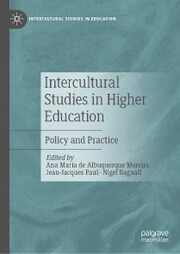This book explores the study of policies and practices in Higher Education by comparing systems, institutions, programs, innovations, results and cultures. In a rapidly changing global and international marketplace, the growth of higher education has occurred within distinct cultural contexts, meaning that change is reflected within local, regional, national and global perspectives. Using a single data methodology across countries and continents, the editors and contributors explore higher education reforms between global and local dimensions, the expansion of access and democratisation, and relevant aspects in the organisation and management of higher education. In doing so, this book arrives at an understanding of higher education at a truly intercultural level, which can lead to a deeper and more holistic understanding of policies and practices in higher education. This innovative book will be of interest and value to students and scholars of higher education across the world as well as the study of interculturality.
Ana Maria de Albuquerque Moreira is Professor at the Department of Planning and Educational Management at the University of Brasilia, Brazil. Jean-Jacques Paul is Emeritus Professor of Economics at the University of Bourgogne, France. He has also worked as a consultant on the evaluation of higher education in Europe and in developing countries. Nigel Bagnall is Associate Professor of International and Comparative Education at the University of Sydney, Australia. He has published on education and belonging, global identity, the International Baccalaureate and international schools.
Chapter 1. The contribution of comparative studies and cross-cultural approach to understand higher education in the contemporary world; Ana Maria de Albuquerque Moreira, Jean-Jacques Paul, Nigel Bagnall.- Chapter 2. Brazil, Russia and Turkey: How new democracies deal with international models of higher education; Maria Ligia Barbosa, Elisaveta Bydanova and Jean-Jacques Paul.- Chapter 3. Interaction system of global education and the national system of education: the social tension zone; Svetlana Sharonova, Natalia Erokhova, Maria Angélica Oliva and Márcia Lopes Reis.- Chapter 4. Internationalisation: A global phenomenon with regional differences. Perspectives of young universities in Austria, Chile and Peru; Ligia Pasqualin, Christian Friedl, Ulrike Pölzl-Hobusch and Rupert Beinhauer.- Chapter 5. An international comparative perspective on higher education institutions' governance and management: Portugal, Finland and Brazil; Sara Diogo, Milka Barbosa and Teresa Carvalho.- Chapter 6. Access to higher education in Portugal, Brazil and Mexico: tensions and challenges for a democratization with quality; João Ferreira de Oliveira, Belmiro Gil Cabrito, Armando Alcântara Santuário.- Chapter 7. Predictors of vulnerability in Latin American higher education; Joaquín Gairín, Diego Castro and Aleix Barrera-Corominas.- Chapter 8. Higher Education expansion in the Portuguese-speaking countries: the case of Angola, Cape Vert and Portugal; Luisa Cerdeira, Belmiro Cabrito, Tomás Patrocinio, Lourdes Machado-Taylor, Rui Brites, Arnaldo Brito, Neusa Barbosa Vicente, Ndilu Mankenda Nkula, Alfredo Buza.- Chapter 9. Globally transformative student experiences: Challenges and opportunities in learning and teaching in the transnational business education program; Nattavud Pimpa, Margaret Heffernen, Jason Downs.- Chapter 10. Higher education assessment in Brazil, the United States of America and the Netherlands: enhancing of quality or regulation instrument?; Catarina deAlmeida Santos, Danielle Xabregas Pamplona Nogueira, Girlene Ribeiro de Jesus.- Chapter 11. A comparative study of the federal higher education student financial aid systems in Brazil, Australia and the UK; Paulo Meyer Nascimento, Manoela Vilela Araújo Resende.- Chapter 12. Higher educated women's labor market outcome indicators: A comparative analysis of six Muslim countries.
„E-Book“ steht für digitales Buch. Um diese Art von Büchern lesen zu können wird entweder eine spezielle Software für Computer, Tablets und Smartphones oder ein E-Book Reader benötigt. Da viele verschiedene Formate (Dateien) für E-Books existieren, gilt es dabei, einiges zu beachten.
Von uns werden digitale Bücher in drei Formaten ausgeliefert. Die Formate sind EPUB mit DRM (Digital Rights Management), EPUB ohne DRM und PDF. Bei den Formaten PDF und EPUB ohne DRM müssen Sie lediglich prüfen, ob Ihr E-Book Reader kompatibel ist. Wenn ein Format mit DRM genutzt wird, besteht zusätzlich die Notwendigkeit, dass Sie einen kostenlosen Adobe® Digital Editions Account besitzen. Wenn Sie ein E-Book, das Adobe® Digital Editions benötigt herunterladen, erhalten Sie eine ASCM-Datei, die zu Digital Editions hinzugefügt und mit Ihrem Account verknüpft werden muss. Einige E-Book Reader (zum Beispiel PocketBook Touch) unterstützen auch das direkte Eingeben der Login-Daten des Adobe Accounts – somit können diese ASCM-Dateien direkt auf das betreffende Gerät kopiert werden.
Da E-Books nur für eine begrenzte Zeit – in der Regel 6 Monate – herunterladbar sind, sollten Sie stets eine Sicherheitskopie auf einem Dauerspeicher (Festplatte, USB-Stick oder CD) vorsehen. Auch ist die Menge der Downloads auf maximal 5 begrenzt.






